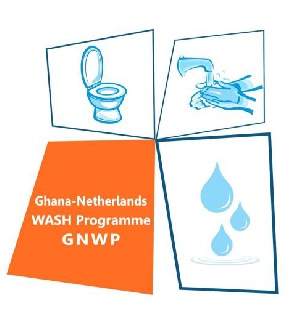 Ghana Netherlands Wash programme
Ghana Netherlands Wash programme
The Netherlands finances 11 Projects under the Ghana-Netherlands Water, Sanitation and Hygiene Programme (GNWP).
The Dutch leveraged with € 37 million of subsidy an amount of € 60 million from the private sector.
The concept of turning WASH solutions into business opportunities rather than a purely government driven intervention, is innovative for Ghana and considered as an opportunity for Dutch and Ghanaian businesses.
The projects concern Public Private Partnerships providing innovative solutions to Ghana’s water, sanitation and waste challenges.
Projects deal with supply of safe drinking water to urban communities whilst others address waste issues by turning faecal sludge or organic waste into electricity, biogas, compost or charcoal.
These products can be marketed to provide income and jobs for young people and women.
The projects are implemented across Ghana between 2013 and 2020 and improve the well being of about 3 million people in urban areas.
Background information
The Ghana WASH Window is part of the Ghana- Netherlands Water, Sanitation and Hygiene Programme (GNWP) which started in 2012. The GNWP is funded by a 100 million euros grant from the Netherlands Government and 50 million financing from the Government of Ghana.
The following projects have been selected for the Ghana WASH WINDOW (GWW) as a result of three public calls for proposals in the period 2013- 2015:
1. Recycling of waste, incineration of waste, electricity generation
Spaans Babcock B.V. in partnership with the Tema Metropolitan Assembly and Global Communities under the SWEEP project will recycle about 20 tons of solid waste per day, incinerate about 180 tons solid waste per day and produce an amount of 5MW electricity generated from Tema Landfill site.
2. Treatment of liquid waste, compost making and marketing
Slamson Ghana Ltd. in collaboration with the Accra Metropolitan Assembly (AMA) and Louis Bolk Institute will contribute to the Bola Bondeh project, This project will enhance the capacity of the “Lavender H ill” treatment plant by the treatment of 800 m3/day liquid waste, and improve the use of sludge for compost making; marketing and sale of compost to 1500 farmers.
3. Construction and operation of water stations,
WaterHealth Ghana limited in partnership with BUCON BV, Global Women Development Promoters and the Ministry of Local Government and Rural Development will support the construction and operation of water stations, which will serve safe and reliable water to 650.000 people in 85 districts.
4.Construction of water stations and develop business operation systems
Safe Water Network with BUCON, Kingdom Water Systems and six Municipal Assemblies in the Volta and Eastern regions of Ghana in a partnership will construct water stations and develop business operation systems to enhance access to sustainable, safe and reliable water to about 150.000 people in 40 communities.
5. Manufacturing of Biofil toilets
The Private and Social Toilets (PRISTO) project implemented by Biofill Ghana and Triarii B.V; will support the efficient manufacturing of improved and cost effective Biofil toilets for communities. The project will also develop marketing strategies of cheaper toilets and provide microfinance for households and public toilets operators in Ga Central. This is to ensure increased access to affordable toilets in Ghana.
6. Biogas and compost out of waste and construction of public toilets.
Under the Special Treat Project, MDF Training and Consultancy B.V., Koajay Group limited and the Municipal assemblies of Nsawam, Ga Central and Ga West will treat the waste generated by the inmates of the Nsawam prison and three other assemblies and turn it into useful products like biogas and compost; also construction and operation of public toilets.
7. Construction and operation of boreholes with hand pumps
Access Development Limited, IDEA and Wassa East District under the Sustainable Rural Water Service Delivery project, seeks to enhance the construction and operation of 200 new and rehabilitated boreholes with hand pumps to provide reliable water to 40.000 people in 150 communities. The project will also create local jobs as well as develop local capacity for manufacturing, operation and maintenance of the water systems.
8. Hygiene promotion, management of community/private toilets, credit for household toilets.
Under the Partnership for Advancing Sustainable Sanitation (PASS) project, implemented by WSUP (UK based NGO),Ga West, Unilever and HFC Boafo, the project seeks to enhance hygiene promotion such as hand washing with soap, management of community/private toilets, credit for household toilets. This project also will adopt innovative technologies that will add value to waste generated in Ga West. Capacities of the local assemblies are been built on improved property tax collection and maintenance as a means of supporting the assemblies manage waste in more sustainable ways.
9. Waste water for fish feed in aquaculture, for composting and for briquettes
Creating and Capturing Value from waste is a project implemented by the International Water Management Institute, RUAF Foundation, Jekora Ventures and Techiman municipality. Under this project, Innovative technologies are applied in using waste water for fish feed in aquaculture, for composting and for briquettes in efficient cooking stoves. This project is based on a business model that creates local jobs for women fish sellers and local restaurants.
10. Collection of market and household waste, use for bio-fertiliser, biogas and small-scale electricity production.
The Ashiaman municipal, Wereldwaternet, Royal HaskoningDHV in partnership with Safisana under the decentralized Business Model for Sanitation and Bio-fertiliser project are implementing developed strategies that addresses the waste problem in Ashiaman, by collecting market and household waste and using it for bio-fertiliser, biogas and small-scale electricity production.
11. Hygiene promotion for school children through football coaches / construction of school toilet blocks
Football for WASH project is being implemented by the Dutch company Vitens/VEI in partnership with the SHEP-GES, Professional Football Association of Ghana and the Dutch KNVB. Amongst others, this project ensures hygiene promotion for school children through football coaches in combination with training and teambuilding.
The project also supports the construction and management of school toilet blocks in selected schools in the Greater Accra and Central regions.